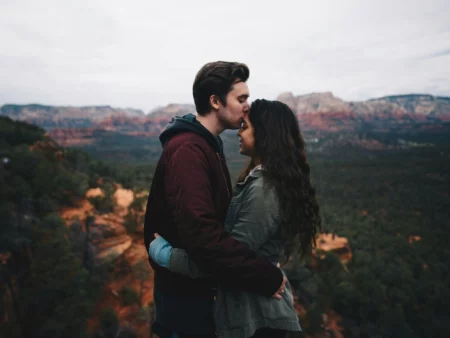Embarking on the journey of asking someone out is like stepping onto a vibrant canvas of emotions. Picture a symphony of warm hues intertwining with delicate curves, representing the flutter of excitement in your chest. This moment celebrates human connection and authentic self-expression.
As we navigate the nuanced art of invitation, we’ll explore crafting your approach with sincerity and grace. Prepare to unlock the secrets of meaningful conversations, decode the subtle language of attraction, and cultivate an environment where genuine connections flourish.

As we delve into the intricacies of communication in dating, we’ll discover how mastering this skill can transform your romantic prospects.
Understanding the Importance of Communication in Dating
In the intricate dance of romance, clarity serves as the guiding rhythm. Effective communication forms the bedrock of meaningful connections, transforming fleeting moments into lasting bonds. As we navigate the delicate terrain of romantic interest, our words become the brushstrokes that paint the canvas of potential relationships.
Consider communication as a bridge, spanning the gap between two hearts. Each conversation lays another plank, strengthening the structure that supports mutual understanding. It’s through these exchanges that we unveil our true selves, allowing our feelings to surface and our intentions to crystallize.
The art of connection lies not in grand gestures, but in the subtle nuances of everyday interactions. It’s in the gentle affirmation of shared experiences and the courage to express genuine emotions that true intimacy blossoms.
This wisdom echoes the sentiment of many relationship experts who emphasize the power of authentic expression. By cultivating openness and honing our communicative skills, we create an atmosphere ripe for romantic exploration. Remember, it’s not just about speaking; active listening plays an equally crucial role, demonstrating support and fostering deeper connections.
With a solid understanding of communication’s role, let’s explore how building confidence can elevate your dating game.
Building Confidence: The Foundation of Successful Dating
Cultivating confidence is the cornerstone of successful dating, transforming hesitation into charisma. It’s about embracing your authentic self, not projecting bravado. To bolster your self-assurance, consider these innovative strategies:
- Practice “mirror affirmations”: Vocalize positive attributes beyond physical appearance.
- Engage in “social stretching”: Expand your comfort zone through brief conversations in low-pressure settings.
- Develop a “confidence playlist”: Curate empowering songs for pre-social boosts.
- Master the “power pose”: Adopt expansive postures to reduce stress hormones.
- Implement the “compliment challenge”: Offer genuine compliments daily to foster social fluency.
Projecting confidence is an art form, balancing self-assuredness with humility. Maintain relaxed body language and speak with measured enthusiasm. Embrace humor to diffuse tension and showcase your personality.
Preparation is crucial for boosting confidence. Research shared interests or current events to fuel engaging conversations, creating a safety net against awkward silences. This advice applies to both in-person and text-based interactions, ensuring you’re ready for any dating scenario.
Lastly, reframe your perspective on rejection. Treat it not as an offense but as a chance for growth. This mindset shift alleviates pressure, allowing you to approach dating with curiosity and adventure. Remember, building chemistry and recognizing mutual signals are key to nurturing potential relationships.
Now that we’ve boosted your confidence, it’s time to tackle the crucial aspect of timing in asking someone out.
Timing is Everything: Choosing the Right Moment to Ask
Mastering the art of timing in romantic pursuits is like orchestrating a delicate dance. The right moment can transform an awkward situation into a serendipitous connection. Recognizing these golden opportunities requires a keen sense of social cues and shared emotional rhythms.
Consider the ebb and flow of your interactions. Is there a natural crescendo in your conversations, when laughter comes easily and casual touches feel effortless? These are ideal moments to take that leap. Pay attention to contextual cues: a shared joyful experience or a quiet moment of vulnerability can serve as perfect backdrops for expressing interest.
However, timing isn’t just about the perfect moment; it’s also about respecting the other person’s circumstances. Be attuned to their current expectations and emotional availability. If they’re navigating significant life changes, patience may be your most valuable ally.
In the digital age, even online interactions offer opportune moments. A thoughtful response or witty exchange can pave the way for a more personal invitation. Trust your intuition while remaining mindful of the other person’s cues. Sometimes, the right moment is simply when you both feel at ease, whether rooted in long-standing friendship or a newfound connection.
With perfect timing in mind, let’s explore effective approaches to express your interest and make that crucial ask.
Crafting Your Approach: Effective Ways to Express Interest
Expressing romantic interest is a delicate dance of subtlety and sincerity, tailored to the individual and your shared history. Begin with casual conversations that naturally evolve, revealing your intentions. For example, you might say, “I’ve really enjoyed our time together. How about we grab coffee, just us two?” This low-key invitation opens possibilities without applying pressure.
For those who prefer directness, honesty can be refreshing. A candid “I find you fascinating and would love to explore a deeper connection” can be both flattering and clear. However, it’s essential to read the room and adjust your approach based on the other person’s comfort level.
| Approach | Potential Outcome | Best Used When |
|---|---|---|
| Subtle hints | Builds anticipation, risk of misinterpretation | Gauging reciprocal interest |
| Casual invitation | Low-pressure, easy acceptance | Established rapport or friendship |
| Direct expression | Clear intentions, immediate feedback | Strong mutual attraction signals |
| Shared activity | Natural progression, highlights commonalities | Common interests identified |
| Playful challenge | Creates excitement, memorable interaction | Lighthearted relationship dynamic |
Authenticity is key, regardless of your chosen method. Ensure your approach aligns with your personality and the unique dynamics of your relationship. Craft your words to reflect genuine interest in the person’s character, not just the idea of dating. This thoughtful strategy increases the likelihood of a positive response and lays the groundwork for a meaningful connection.
As we refine our verbal approach, it’s time to unlock the secret language of body language in dating communication.
The Power of Body Language in Dating Communication
In the silent symphony of attraction, your body speaks volumes. Mastering non-verbal cues can transform your dating game from awkward to alluring. Picture yourself as a living canvas, where every gesture paints a story of assurance and intrigue. Start with posture—stand tall, shoulders back, chin slightly raised. This open stance projects self-assurance and invites connection.
Your eyes are powerful engagement tools. Maintain gentle eye contact, allowing your gaze to linger just enough to spark interest without discomfort. Complement this with a genuine smile that reaches your eyes, creating an inviting aura. Subtle mirroring of your companion’s movements can foster rapport and shared understanding.
Mind personal space. Gradually decrease physical distance as comfort grows, always respecting boundaries. Lean in slightly during conversation to show attentiveness, and use open palm gestures to convey honesty. A light touch on the arm can create an electric moment when timed perfectly.
With body language mastered, let’s navigate the digital landscape of modern dating.
Handling Rejection: Maintaining Grace and Resilience
Rejection, while painful, can be a catalyst for personal growth and self-discovery. Embracing this perspective transforms setbacks into stepping stones. When faced with a “no,” view it as an opportunity to refine your approach and deepen your self-understanding. Remember, rejection often says more about timing and compatibility than personal worth.
To navigate rejection gracefully, consider these innovative strategies:
- Practice “emotional alchemy” by transmuting disappointment into motivation
- Engage in “rejection exposure therapy” to build resilience
- Cultivate a “growth mindset” journal to reframe experiences positively
- Implement a “self-compassion ritual” to nurture inner kindness
- Create a “rejection rebound playlist” for mood elevation
- Volunteer or mentor others to gain perspective
- Join a support group to share experiences and coping strategies
Maintain perspective by recognizing that each “no” brings you closer to the right “yes.” Embrace the learning curve, viewing each interaction as valuable data for future success. By approaching dating with curiosity and openness, you transform potential disappointments into opportunities for personal evolution and authentic connections. Remember, building resilience requires patience and practice.
With resilience in your toolkit, let’s explore the delicate transition from friendship to romance.
Creating the Right Environment: Setting the Stage for Success
Crafting the perfect ambiance for asking someone out is an art form that blends subtlety with intention. Imagine a setting where comfort and connection intertwine, creating a cocoon of possibilities. The ideal environment should feel like a gentle embrace, inviting openness and authenticity.
Consider a location that resonates with shared interests or fond memories. Perhaps it’s a cozy café where you’ve shared countless conversations, or a scenic overlook that breathes life into your words. The key is to choose a space that minimizes external pressures and amplifies your natural rapport.

Timing plays a crucial role in setting the stage. Opt for a moment when you’re both relaxed and unhurried, allowing the conversation to unfold naturally. Pay attention to subtle cues in your companion’s body language and energy levels, ensuring they’re receptive to deeper dialogue.
Remember, the most powerful environment is one that fosters genuine connection. By curating a space that encourages authenticity, you lay the foundation for a meaningful exchange, regardless of the outcome. Consider the ambiance as a silent partner in your endeavor, one that whispers encouragement and sets the tone for possibilities.
With the perfect environment set, let’s discuss the crucial steps to take after you’ve asked someone out.
The Follow-Up: What to Do After Asking Someone Out
The aftermath of asking someone out is a pivotal moment that can shape the trajectory of your potential relationship. If you receive a positive response, resist the urge to over-plan. Instead, focus on maintaining the natural flow of your connection. Suggest a casual first date that aligns with shared interests, allowing for comfortable conversation and genuine interaction.
In the face of rejection, grace is your greatest ally. Respond with dignity, thanking them for their honesty. This mature approach not only preserves your self-respect but also leaves the door open for future friendship. Remember, rejection often stems from timing or compatibility, not your worth.
Should you encounter uncertainty, patience becomes paramount. Offer space for reflection while expressing your continued interest. You might say, “I understand you need time to think. I value our connection and am open to exploring it further when you’re ready.” This approach demonstrates respect for their feelings and decision-making process.
Regardless of the outcome, view this experience as a step forward in your personal growth. Each interaction refines your understanding of relationships and self, contributing to your emotional intelligence and dating acumen. Embrace the journey, for it’s through these moments that we truly learn about ourselves and others.
As we wrap up our journey, let’s reflect on the importance of authenticity and vulnerability in dating.
Conclusion: Embracing Vulnerability and Authenticity in Dating
As we conclude our exploration of asking someone out, remember that authenticity is your greatest ally. Embrace vulnerability; it showcases your courage and depth. Approach dating with sincerity, creating space for genuine connections. Let your unique qualities shine through every interaction. The right person will unconditionally accept your true self. Take a deep breath, summon your inner strength, and step forward confidently. Whether the outcome is a blossoming romance or a graceful redirection, each experience contributes to your growth. In the dance of relationships, your authenticity sets the rhythm for meaningful connections. Trust in yourself, and let your genuine interest guide you towards exciting possibilities.
Now that we’ve covered the essentials, let’s address some common questions about asking someone out.
Frequently Asked Questions About Asking Someone to Date You
Is it okay to ask someone out over text or social media?
Asking someone out via text or social media is increasingly common and can be effective, especially for those more comfortable with digital communication. However, consider the individual's preferences and your rapport. Craft a thoughtful, personalized message reflecting genuine interest and suggest a specific plan for meeting in person.
What should I do if I get rejected when asking someone out?
Facing rejection gracefully showcases character. Respond with a sincere "Thank you for your honesty." Process emotions privately, viewing the experience as a learning opportunity. Maintain dignity by treating the person kindly. Use this moment to refocus on personal growth and self-improvement.
How can I make asking someone out less awkward?
To reduce awkwardness when asking someone out, create a relaxed atmosphere in a comfortable setting. Suggest a shared activity casually. Practice confidence-boosting techniques beforehand, remembering that authenticity matters most. Embrace the experience as an opportunity for personal growth, regardless of the outcome.
Should I ask someone out if we're already friends?
Transitioning from friendship to romance requires careful consideration. Weigh the impact on your existing bond and assess mutual interest through subtle cues and open communication. If proceeding, approach sensitively, emphasizing your value for the friendship regardless of the outcome. Navigating this shift demands thoughtfulness and respect.
How long should I wait before asking someone out after meeting them?
Timing for asking someone out varies with chemistry and context. Aim for 2-3 engaging interactions to gauge interest. Balance enthusiasm with patience, allowing rapport to develop naturally. Focus on building a solid foundation, as genuine connections often unfold organically. Trust your intuition, but avoid rushing.
What are some creative ways to ask someone on a date?
Elevate your invitation with a personalized scavenger hunt or heartfelt poem. Arrange a mini-adventure based on shared interests, like a local food tour or stargazing expedition. For tech-savvy individuals, design a custom app revealing your proposal creatively.
How do I handle my nerves when asking someone out?
Embrace butterflies as allies in your quest for connection. Breathe deeply, focusing on genuine interest. Visualize positive outcomes, channeling nerves into enthusiasm. Practice power poses to boost confidence. Remember, vulnerability is endearing—authenticity trumps perfection in matters of the heart.
What should I do if the person I want to ask out is in a relationship?
When attracted to someone in a relationship, prioritize integrity. Channel emotions into personal growth and expand your social circle. Maintain boundaries, focusing on platonic connections. Ethical behavior fosters long-term happiness. Redirect energy towards pursuits aligning with your values and aspirations.

Jeffrey Young is an American psychologist renowned for developing schema therapy. He founded the Schema Therapy Institute and is a leader in the field of cognitive behavioral therapy. Young has authored several influential books, including Schema Therapy for professionals and Reinventing Your Life for the general public.







